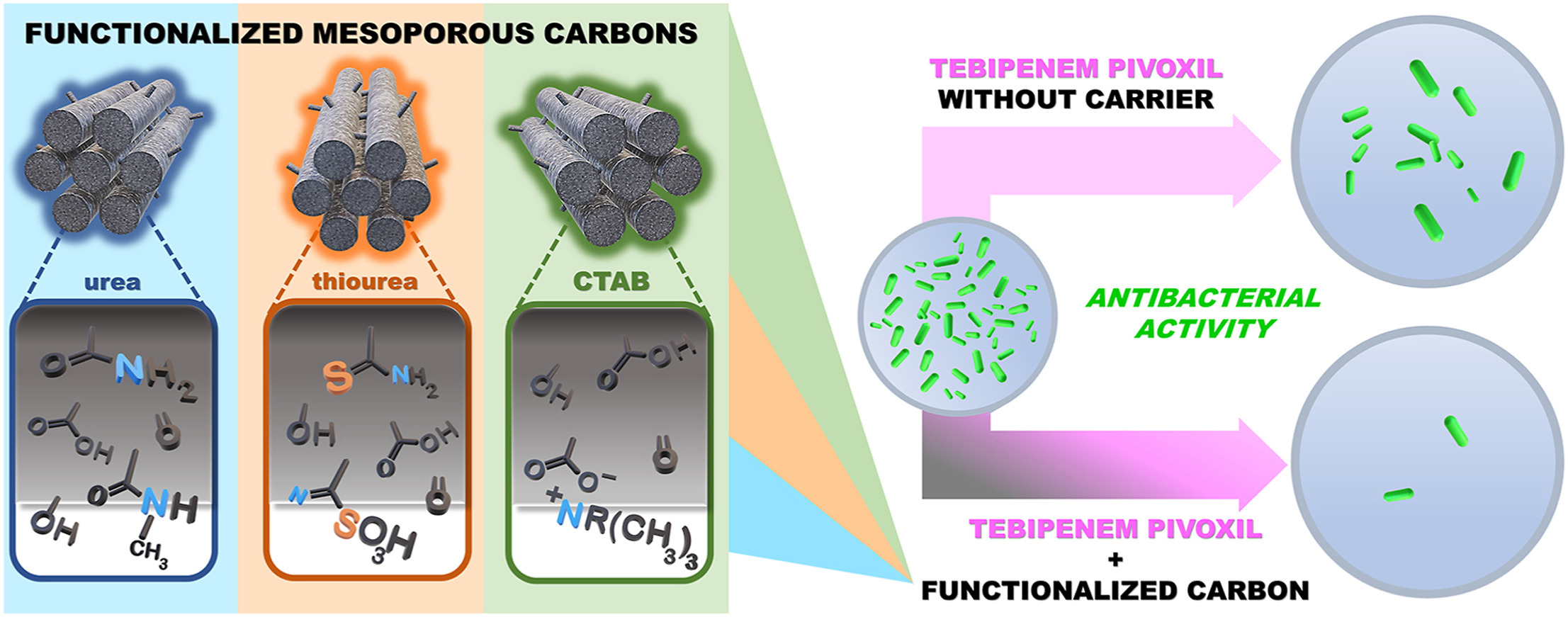Enhancing antimicrobial activity of β-lactam antibiotic via functionalized mesoporous carbon-based delivery platforms

Bacterial immunity to antibiotics is currently increasing as a result of inadequate drug use and the generation of antimicrobial resistance. Developing new antibiotics is challenging, hence suitable carriers are sought to enhance activity of already known drugs. The ordered mesoporous carbons modified with urea, thiourea, and cetyltrimethylammonium bromide (CTAB), presented in this study, show great potential as carrier platforms for tebipenem pivoxil – a broad-spectrum orally-administered β-lactam antibiotic. The functional groups generated on the surface of carbon materials contributed to the reduction of their negative surface charge, which turned into positive under low pH conditions. At the same time, they led to a decrease in the hexagonal structure ordering of the carbon samples and a deterioration of the textural parameters. The effect of the amount of modifier used on the ability of carbon materials to release the selected antibiotic was investigated. The drug release process was carried out in two different environments (neutral and strongly acidic).
Highlights
- Smart tebipenem pivoxil delivery platforms based on mesoporous carbons were synthesized.
- Functionalization with urea, thiourea and CTAB had a key effect on surface charge of carbon.
- The carbon carriers lead to increased solubility and antibacterial activity of antibiotic.
- The highest amount of drug was released from carbon materials modified with CTAB.
- Mesoporous carbons have no impact on drug permeability in the gastrointestinal tract.
It has been shown that the presence of functional groups on the surface of carbon carriers determines the amount of antibiotic liberated, especially at pH 7.0. The antimicrobial activity of the tebipenem pivoxil-loaded into the carbon carriers was assessed on a group of gram-positive and gram-negative bacteria. The highest decrease in the minimal inhibitory concentration value for the CTAB-modified systems was demonstrated, indicating a better antimicrobial efficiency against pathogenic strains coupled with an improvement in tebipenem pivoxil solubility. Small and negatively charged worm-like particles of the surfactant-functionalized carbon carrier are characterized by better dispersion in the receptor fluid resulting in faster and more effective diffusion of the antibiotic molecules from their outer surface. Ordered mesoporous carbons in addition to increased antibiotic dissolution rate, have no impact on drug permeability in the gastrointestinal tract in the in vitro model.
Download full study as PDF here Enhancing antimicrobial activity of β-lactam antibiotic via functionalized mesoporous carbon-based delivery platforms
or read it here
Reagents
Tebipenem pivoxil (purity >98%) was purchased from Pharmachem International Co., (China), acetonitrile (high-performance liquid chromatography [HPLC] grade), ammonium persulfate solution (APS), cetyltrimethylammonium bromide (CTAB, ≥98%), Pluronic P123, sucrose (≥99.5%), tetraethyl orthosilicate (TEOS, ≥98%), thiourea (≥99.0%), urea (99.0–100.5%) were provided by Merck KGaA (Darmstadt, Germany). Formic acid (100%) and other chemical reagents, including hydrochloric acid, hydrofluoric acid, potassium dihydrogen phosphate, sodium chloride, sulphuric acid were obtained from Avantor Performance Materials (Gliwice, Poland). Prisma HT, GIT lipid solution, and acceptor sink buffer were supplied by Pion Inc. (Forest Row, East Sussex, England).
Joanna Goscianska, Aleksander Ejsmont, Anna Stasiłowicz-Krzemień, Szymon Sip, Judyta Cielecka-Piontek, Enhancing antimicrobial activity of β-lactam antibiotic via functionalized mesoporous carbon-based delivery platforms, Microporous and Mesoporous Materials, 2022, 112160, ISSN 1387-1811,
https://doi.org/10.1016/j.micromeso.2022.112160.

